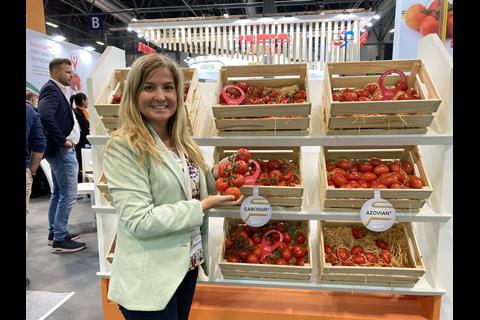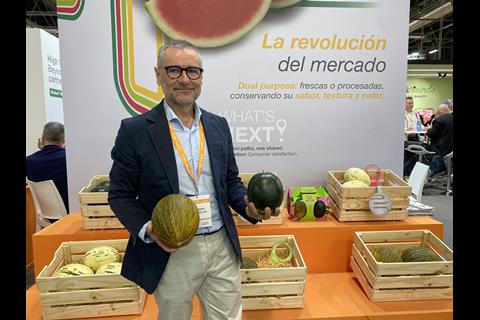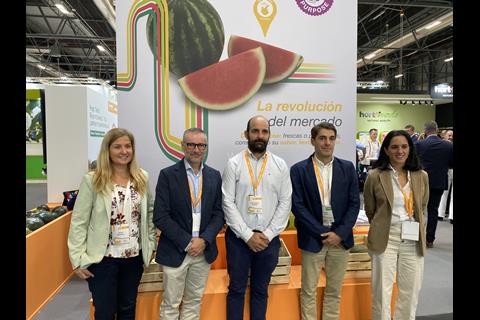Highlights include more ToBRFV-resistant tomatoes, dual-purpose watermelons, and extended precision agriculture software
Vegetable seed company BASF Nunhems unveiled a raft of new innovations at Fruit Attraction 2024, including more rugose-resistant tomato varieties, two new watermelon concepts, and an expansion of its Agrigenio precision agriculture platform.
The company has also added to its sales team to get closer to growers in key production areas. Anna Pedró joined as Iberia country manager in June, and BASF now has an area manager in both Almería and Murcia, Miguel Espinosa and Pedro García respectively.
The new structure will boost the company’s “agility, efficiency and response capacity”, García said.
Rugose-resistant tomatoes
BASF now has an extensive portfolio of ToBRFV-resistant tomato varieties in nearly all types, according to Ester Serrano, the breeder’s tomato lead in EMEA.
“We have varieties for winning the battle against rugose without compromising on either the quality of the fruit or its productivity, firmness or calibre”, she said.
Highlights include Cabosur, Caboluna and Tobriva vine tomatoes, launched in 2023 and 2024. The first two are suited to Spanish production, while the third is for Morocco.
In addition, there are the Azovian and Miravian pear tomatoes, the Daivion cherry tomato, and the Dreampower rootstock, as well as Vitalion and Culturion (cherry vine tomatoes), and Marvellion (a cocktail variety).
There are also two resistant varieties in the breeder’s ‘non-leaking’ Intense range aimed at the foodservice sector. These have more flesh and less water, making them less likely to leak in a sandwich or a salad.
“We’ve improved the range from the agricultural and the handling perspectives, in addition to achieving fruits with greater quality and consistency”, Serrano said.
The seed company has two tomato improvement programmes, one centred on varieties for mid-tech greenhouses (in Almería and Murcia), and another targeted at varieties for high-tech greenhouses in northern Europe.
Premium tomatoes Vitalion and Marvellion came from the latter, and BASF has carefully selected a group of producers to protect the quality and consistency of these varieties.
The objective is to connect the entire value chain, from the farmer to the distributor, to bring a product to market that has “a very high standard of quality that satisfies the consumer”, Serrano said.
Customer marketing specialist Nasir Ahmed explained that the next step for Vitalion – which has been well received by UK retailers – is to develop new versions of the variety with mildew resistance and other attributes.
“We need to think two years ahead,” he told Fruitnet. “It’s not just about rugose resistance; it’s also about mildew, size etc. Now we’re looking two years ahead to see what Vitalion 2, Vitalion 3 and Vitalion 4 could look like. We’re not going to rest on our laurels. We’re going to continue to improve upon the variety.”
Dual Purpose watermelons
Alongside tomatoes, watermelons were a major focus for BASF at the show. The breeder’s Dual Purpose range includes watermelon varieties suitable for both the wholehead and fresh-cut markets and is designed to cater to retailers’ various needs.
This season, BASF has added two new varieties to the range, Amazo and Zenium, to sit alongside existing varieties Bazman and Harmonium.
All four have three common characteristics: firmer flesh, a crunchy texture, and “exceptional” flavour. There are medium-sized, weighing 4-7kg. Between them, they cover the whole growing season.
EMEA crop lead for melons and watermelons, Juan Pedro Pérez, says growers and retailers have been “really satisfied”, adding that he believes this dual-purpose concept is “the direction the market will take”.
Mini watermelons
In addition, BASF has launched a miniature watermelon weighing around 2kg called Takemi. It has micro-seeds, black skin, and internal quality “that matches retail expectations”.
Takemi can be grown both in either a single-crop programme or “in the pollinator mode”. Importantly, it boasts high yields, which is one of the main problems faced by producers of small watermelons.
2024 is the first year of commercialisation for Takemi and Pérez says there are “some important programmes being agreed for next season”.
Commercial production began in Spain and Italy this year, and other countries such as Italy and Turkey are still in trials.
Precision agriculture
Last but not least, BASF has also expanded its precision agriculture tool to help growers make sustainable decisions and ensure high yields with fewer inputs.
The Agrigenio DSS uses mathematical models to advise growers on crop management, including pest and disease control, irrigation, and the use of fertilisers.
The platform collects data from sensors, weather stations and other sources. And it is now available to growers of onions and potatoes – as well as tomatoes, table grapes, and other crops.
“We are trying to find the synergies between BASF’s crop protection products and seeds. We hope we can secure the maximum yield of every seed with the correct doses and applications of crop protection products.”
In addition, BASF has a tool called YouSustain to allow growers to assess the sustainability of their farm against around 200 indicators.
The aim is to help producers improve the efficiency of their production processes, to provide data for ESG reports, and to meet customer requirements and facilitate exports.






